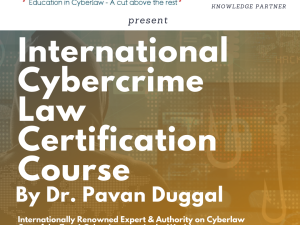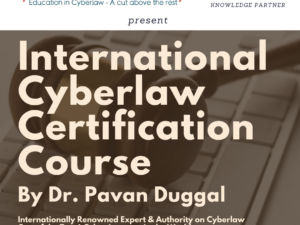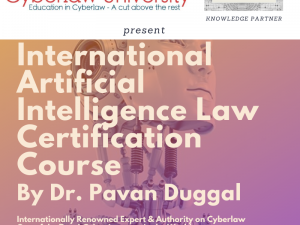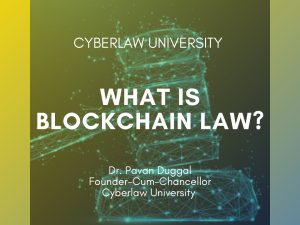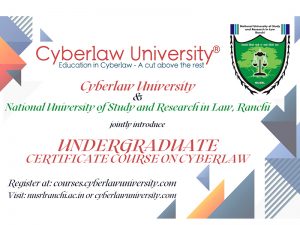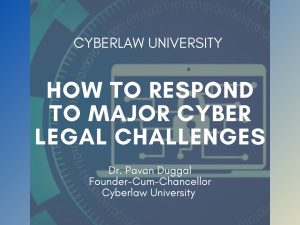INTERNATIONAL CYBER SECURITY LAW CERTIFICATION COURSE
- Description
- Reviews
![5Pr0pinternationalcybersecuritycertificationcourse[1]](https://cyberlawuniversity.com/wp-content/uploads/2021/01/5Pr0pinternationalcybersecuritycertificationcourse1.png)
The International Certificate Course on Cyber Security Law is your gateway to world’s new emerging trends and perspectives pertaining to legalities of cyber security at the international level. Cyber security is central to our lives and hence present legal, policy and regulatory challenges of cyber security becomes crucial interest of today’s times.
To address these specific legalities pertaining to cyber security, a new sub-discipline of legal study being Cyber Security Law has evolved under the broad umbrella of Cyberlaw. Cyber Security Law as legal jurisprudence is developing at a very rapid pace, with different countries contributing to this evolving jurisprudence.
In this International Certificate Course on Cyber Security Law, you will got opportunity to discover the emerging thrust areas in Cyber Security Law jurisprudence. The international approaches being taken for regulating cyber security, distinctive national approaches and perspectives for cyber security and also massive impact of continuing cyber security breaches on Critical Information Infrastructure, cyber sovereignty, emerging technologies like Artificial Intelligence, Internet of Things and Blockchain and also emerging trends of Cyber Security Law.
The present Certificate Course is beginning of new journey for you to discover how this new sub-discipline of Cyber Security Law has developed so far and what are the potential thrust areas that are likely to concentrate in the coming years. Doing this Course will enable you to expand the horizon of your knowledge and will expose you to be better prepare to tackle with cyber security challenges in the digital ecosystem and will sensitize you of how emerging cyber security jurisprudence is evolving in the direction of protection and preservation of Cyber Security Law. This course is 12 weeks course and aims to update your knowledge and skillsets of major thrust areas of cyber security areas.
Course Curriculum
WEEK-1:- CYBER SECURITY AND CYBER SECURITY LAW
a) Introduction
b) Cyber Security – Concept, Origin and Growing Importance
c) Various Elements of Cybersecurity
d) Increasing Cyber Security Breaches and their impact – Historical Evolution And Current Position
e) Relation between Cybersecurity and Cybercrime
f) Cyber Security Law – Concept, Origin And Development
g) Areas of Cybersecurity Law Jurisprudence
h) Relationship between Cyberlaw and Cybersecurity Law
WEEK 2:- ABSENCE OF GLOBAL LEGAL REGIME ON CYBER SECURITY
a) Absence of a Global Law on Cyber Security
b) Budapest Convention and its impact on Cyber Security
c) National Cyber Security Laws And Their Role in Cyber Security Regulation
d) Cybersecurity Laws Worldwide
WEEK 3:- AMERICAN LAWS ON CYBER SECURITY
a) American Position on Cyber Security Law
b) New York’s “Stop Hacks and Improve Electronic Data Security Act” (SHIELD ACT) and its Impact
c) The NYDFS Cybersecurity Regulation (23 NYCRR 500) – Pathbreaking and Impactful
d) California Internet of Things Cyber Security Law – Dawn of a New Era
e) US Computer Fraud and Abuse Act – Salient Features & Significance
f) Ohio Cyber Security Safe Harbor Legislation- Salient Aspects & Importance
g) South Carolina Insurance Cyber Security Law – Essential Elements & Impact
WEEK 4:-EUROPEAN AND ASIA PACIFIC LAWS ON CYBER SECURITY
a) The European Union’s Cybersecurity Act –Salient Features and Importance
b) New European Cyber Security Framework – Scope & Impact
c) Russia RU Net law- A Different Beginning
d) China’s Cyber Security Law and New Cyber Security Rules of China in 2020
e) Vietnam Cyber Security Law And Its Significance
f) Australian Anti-Encryption Law- A new approach to Regulating Encryption
WEEK 5:- NATIONAL CYBER SECURITY POLICIES, STRATEGIES AND BREACH NOTIFICATION LAWS
a) National cyber security policies and their impact
b) National cyber security strategies and their growing significance
c) Implementation of national cyber security laws, policies and strategies and Practical Challenges
d) Breach notification laws in different countries and their impact on cyber security regulation
e) Rights, duties and responsibilities of cyber security ecosystem stakeholders
WEEK 6:- CYBER ATTACKS AND CYBER SOVEREIGNTY
a) Cyber Attacks- Definition, Salient Features and Historical Evolution
b) Impact of Cyber Attacks
c) Cyber legal approaches to deal with cyber-attacks
d) Lack of international law / legal frameworks to deal with cyber-attacks
e) Attribution and Jurisdiction issues in cyber-attacks
f) Existing Mutual Legal Assistance Treaty (MLAT) and their efficacy in cyber-attacks sharing information
g) Lack of international norms of behaviour in cyberspace with respect to cyber-attacks
h) Tallinn Manual 1.0 and Tallinn Manual 2.0 and their impact on pushing jurisprudence on cyber-attacks
i) Cyber-attacks and Sovereignty
j) Cyber Sovereignty – Concept, Features and Evolution
k) Legal and Policy issues and challenges concerning Cyber Sovereignty
WEEK 7: CYBER RESILIENCE
a) Cyber Resilience – Definition and Historical Evolution
b) Salient Features of Cyber Resilience
c) Increasing Cyber Security Breaches and growing importance of Cyber Resilience
d) Legal, Policy and Regulatory Issues Concerning Cyber Resilience
e) Cyber Security & Cyber Resilience
f) Cyberlaw, Cybercrimes & Cyber Resilience
g) Cyberlaw & Cyber Resilience
h) Data Protection, Intermediaries and Cyber Resilience
i) Global Cyber Resilience Framework
j) Cyber Resilience & Cyber Insurance
k) Cyber Hygiene, Cyber Insurance and Cyber Resilience
WEEK 8:- ARTIFICIAL INTELLIGENCE AND CYBER SECURITY ISSUES
a) Artificial Intelligence- Concept and Growing Importance
b) Potential Misuse Of Artificial Intelligence – Need For Protecting And Preserving Cybersecurity Of AI Systems
c) Artificial Intelligence and Cybersecurity
d) Attribution Challenges In AI Ecosystem
e) Duty To Incorporate Cybersecurity As An Integral Component Of Artificial Intelligence Architecture
f) Duty Of Cybersecurity Due Diligence For AI Developers
g) Applicability Of Existing Cyber Security Laws To Artificial Intelligence
h) Darknet, Cyber Security And AI
i) Intermediary Liability In The Context Of AI
j) Norms Concerning Cybersecurity In The Context Of AI
WEEK 9:- CRITICAL INFORMATION INFRASTRUCTURE AND CYBER SECURITY ISSUES
a) Concept and Growing Importance of Critical Information Infrastructure
b) Increasing Cyber Security Breaches on Critical Information Infrastructure
c) Protection of Critical Information Infrastructure under national cyber law frameworks
d) Legal, policy & regulatory issues with respect to protecting Critical Information Infrastructure in COVID-19
e) US national emergency regarding cyber-attacks on Electric Grids
f) Chinese cyber security regulations and their impact on protecting Critical Information Infrastructure
g) Emerging international best practices for protecting Critical Information Infrastructure
WEEK 10: CYBER SECURITY DURING COVID-19 TIMES
a) Advent of COVID-19 and its impact on Cyber Security
b) Increased Phishing Instances
c) Important Cyber Security Breaches and their Characteristics
d) Bruno University Hospital Case
e) Cyber Attacks on US Health Department
f) Phishing targeting Hospitals
g) COVID-19 legislations and rules and impact on cyber security
WEEK 11:- INTERNET OF THINGS AND CYBER SECURITY
a) Internet of Things- Definition and Salient Features
b) Internet of Things & Cyber Security Breaches
c) Lack of unanimity on cyber security standards for IoT
d) California Law on IoT and reasonable security features
e) United Kingdom approach on Cyber Security and IoT
f) Jurisdiction & Internet of Things
g) Liability of service providers in Internet of Things
h) Surveillance & Monitoring of Internet of Things and Cyber Security
WEEK 12:- EMERGING TRENDS AND ISSUES ON CYBER SECURITY AND CYBER SECURITY LAW
a) Growing Cyber Security Incidents during COVID-19 Times
b) Cyber Security and Work From Home
c) Corporate Liability for Cybersecurity Breaches
d) Cyber Security & Video Conferencing and Connected Challenges
e) Video Conferencing and Cyber Security –Legal, Policy and Regulatory Issues
f) Advent of the New Cyber World Order and its impact on Cyber Security;
g) Need for building and strengthening Cyber Security capacity amongst countries through technical assistance and training, policy roundtables, crisis management exercises, and the exchange of best practices related to information and communication technologies
h) Building Cyber Security Capacity – The Organization of American States (OAS) Model
i) Emerging Trends in Cyber Security Law
How to Use
After successful purchase, this item would be added to your courses. You can access your courses in the following ways :
- From the computer, you can access your courses after successful login
- For other devices, you can access your library using this web app through the browser of your device.

